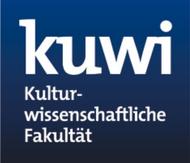Events and news
Milan Babić: Geo-economics - Anatomy of the New World Order
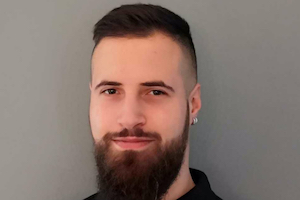
26 January
14:15-15:45 pm, online on Zoom.
Milan Babić (University of Amsterdam): Geo-eonomics - Anatomy of the New World Order
When Corona revealed the fragility of supply chains, there was soon talk of "de-globalisation". Protectionist demands are being derived from the rise of China. And in view of increasing international tensions, many are talking about a return of geopolitics. However, Milan Babić believes it is too easy to conclude from this that neoliberal globalisation is over and that the (nation) state is back. States are not saying goodbye to transnational networks. Instead, we are experiencing a regionalisation that also follows economic imperatives. And companies are still key players in the battle for global infrastructures. According to Babić, anyone who wants to understand the emerging world order must therefore look at it from the perspective of geoeconomics.
Milan Babić is Associate Professor in Political Economy at the Political Science Department at the University of Amsterdam and PI of the DECARB Project.
The lecture will be held in German.
Andreas Bähr: Times of Crisis. Concepts of the Past, Present and Future in Early Modern Human-Environment Relations
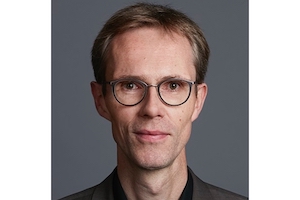
19 January
4.15-5.45 pm,
AM 233 and online on Zoom.
Lecture as part of the Lecture Series "Beyond Sustainability: Humanities and Social Sciences Perspectives on the Ecological Crisis".
Andreas Bähr (EUV): Times of Crisis. Concepts of the Past, Present and Future in Early Modern Human-Environment Relations
Crises are times when the fate of individuals, cultures, and societies is decided. In the early modern period, an era marked by climate change, epidemics, and war, this decision was conceived against the backdrop of the apocalypse. ‘Crisis’ meant the interpretation of divine signs in terms of salvation history, which promised insight into the progress and end of the world and thus provided guidance for human decision-making and action. The knowledge of the future inscribed in this practice of sign reading was fraught with constitutive provisionality and uncertainty. However, awareness of this uncertainty did not lead to desperate resignation or a carefree pursuit of private interests. Rather, it made people realise that in order to ensure their own self-preservation, they must always consider the impact of their actions on the entire human and natural world.
The lecture will be held in English, questions can also be asked in German.
André Rottmann: Images, Infrastructures and Intelligences. Ecologies of Contemporary Art between Nature and Technology
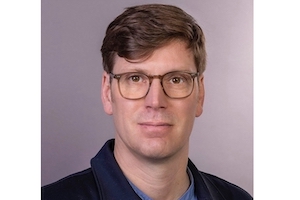
12 January
4.15-5.45 pm,
AM 233 and online on Zoom.
Lecture as part of the Lecture Series "Beyond Sustainability: Humanities and Social Sciences Perspectives on the Ecological Crisis".
André Rottmann (EUV): Images, Infrastructures and Intelligences. Ecologies of Contemporary Art between Nature and Technology
Since the 1960s, art has commonly been defined as fraying the boundaries between traditional mediums and new media and as situating, the aesthetic object in expanded spatial, social, political and discursive force fields. From today’s perspective, this critical development may most adequately be revisited in terms of tracing contemporary art’s ecological entanglements: starting with Land Art’s embrace of entropy in industrial landscapes, through site-specific projects attentive to institutional, architectural and urban infrastructures, to recent works signalling the interdependencies of human and non-human, biological and technical actors and actants. This lecture offers a short history of the relationships that art after modernism has been entertaining with its increasingly relational and hybrid environments. In dealing with salient examples of art in the 2020s, such a discussion of an “ecological turn” necessarily entails a closer look at the role of “Artificial Intelligence” in contemporary art theory and practice.
The lecture will be held in English, questions can also be asked in German.
Leon Wansleben: Decarbonisation at your Doorstep. How Infrastructures, Politics, and Climate Activists Shape Household Energy Transitions
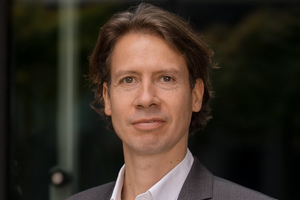
15 December
4.00-5.30 pm,
AM 233 and online on Zoom.
Lecture as part of the Lecture Series "Beyond Sustainability: Humanities and Social Sciences Perspectives on the Ecological Crisis".
Leon Wansleben (Max Planck Institute): Decarbonisation at your Doorstep. How Infrastructures, Politics, and Climate Activists Shape Household Energy Transitions
The renewable energy transition is at the heart of any serious effort to slow down global warming. But while renewables provide growing shares of electricity, shifting household energy consumption from fossil sources to green power proves extremely contentious. This lecture sketches these difficulties and discusses relevant factors that can block or ease household decarbonization. A particular focus lies on distributional politics. While past scholarship has mainly highlighted how fossil interest groups oppose and obstruct climate policy, the general population largely fears losing out from domestic energy transitions. Legacy infrastructures and the degree to which institutions prioritize social provisioning or profit interests shape these attitudes and the legitimacy of climate policy. In this politically contentious situation, climate movements must craft new strategies that consider widespread anxieties and demands for social protection.
The lecture will be held in English, questions can also be asked in German.
Pierre Wat: Paradise Lost? Art Facing the Anthropocene
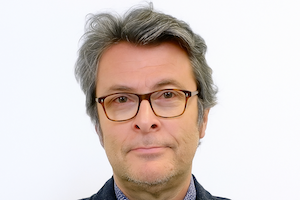
08 December
4.15-5.45 pm,
AM 233 and online on Zoom.
Lecture as part of the Lecture Series "Beyond Sustainability: Humanities and Social Sciences Perspectives on the Ecological Crisis".
Pierre Wat: Paradise Lost? Art Facing the Anthropocene
Can art still re-enchant the world in the age of the Anthropocene? What, then, is the meaning of the word "re-enchantment" in the context of a world whose finitude seems to impose itself as a major horizon? It is the role of art, and that of the aesthetic categories generally associated with it, such as the Sublime and the Beautiful, that we must question today. What function can now be attributed to art, between consolation, lucidity, and the search for a new form of beauty despite everything, which forces us to reconsider our practices and beliefs in this area? By examining a selection of recent works, the lecture will look at how artists are managing, or not, to preserve a sense of wonder in these times of predicted disaster. The question of the power of art in the face of history will thus be raised.
The lecture will be held in English, questions can also be asked in German.
Jan-Erik Schirmer: Climate Liability. The David v. Goliath Dynamic in the Courtroom
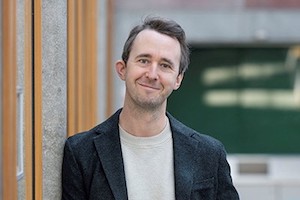
01 December
4.15-5.45 pm,
AM 233 and online on Zoom.
Lecture as part of the Lecture Series "Beyond Sustainability: Humanities and Social Sciences Perspectives on the Ecological Crisis".
Jan-Erik Schirmer: Climate Liability. The David v. Goliath Dynamic in the Courtroom
Across the globe, climate litigation is increasingly directed at carbon majors such as Shell or RWE, with claims demanding compensation for climate-related damages. Plaintiffs are often actors from the Global South - small farmers, island inhabitants, or Indigenous communities. Owing to this David-versus-Goliath constellation, climate liability cases serve a dual narrative purpose: on the one hand, they translate complex climate issues, such as sea-level rise or glacier melt, into concrete individual disputes that can be readily understood by lay audiences and resonate with their lived experience. On the other hand, liability proceedings provide those affected by climate change with a platform to articulate their concerns in a highly visible way and to raise awareness within the global public. The lecture presents key climate liability cases and discusses the extent to which this narrative effect becomes apparent.
The lecture will be held in English, questions can also be asked in German.
Miriam Lang: Fostering Desirable Ecosocial Futures in Times of Darkness
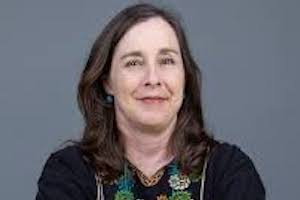
24 November
4:15 - 5:45 pm,
AM 233 and online on Zoom.
Lecture as part of the Ringvorlesung "Beyond Sustainability: Humanities and Social Sciences Perspectives on the Ecological Crisis".
Miriam Lang: Fostering Desirable Ecosocial Futures in Times of Darkness
This lecture will analyse the current disputes around ecosocial transformation in the midst of a civilizational crisis, ranging from the political far right to approaches of systemic transformation, adopting a Latin American perspective. It will also explore what the role of critical social sciences and humanities can be in this scenario, and how we can think about and practice a pedagogy of liberation in these dark times.
The lecture will be held in English, questions can also be asked in German.
Gal Kirn: Liberation Ecology - A Blueprint for Future Research
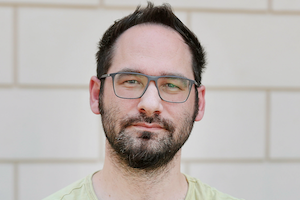
17 November
4:15 - 5:45 pm,
AM 233 and online on Zoom.
Lecture as part of the Ringvorlesung "Beyond Sustainability: Humanities and Social Sciences Perspectives on the Ecological Crisis".
Gal Kirn: Liberation Ecology - A Blueprint for Future Research
The inquiry into a "liberation ecology" aims to trace various moments, artworks and theoretical fragments that were produced by heterogeneous liberation movements in (semi-)peripheral locations, particularly in the second part of the 20th century. Environmental sensibilities and awareness, paired with an important relationship to the land emerged in the (semi-)peripheries long before the Western "ecological turn" in the 1970s, and were able to articulate an explicit care for and alliance with the non-human world in the struggle against fascist or colonial oppression. This research aligns itself with the "maroon ecology" (Malm 2018) and shares the broader perspective of "decolonial ecology" (Ferdinand 2019), which opposes the mainstream Western politico-philosophical-aesthetic canon that determines who or what is (or is not) included in the distribution of the sensible, and exposes what have been -in the most impossible circumstances-artistic expressions of environmental care.
The lecture will be held in English, questions can also be asked in German.
Anna Henkel: Dilemmas of Sustainability
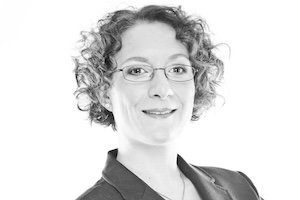
November 10
4:15-5:45 pm,
room AM 233 and online on Zoom.
Lecture as part of the Lecture Series "Beyond Sustainability: Humanities and Social Sciences Perspectives on the Ecological Crisis".
Anna Henkel: Dilemmas of Sustainability
Sustainability is generally recognised as a concept and an objective. In practice, however, it is sometimes understood in very different ways, and conflicts regularly emerge. In order to deal with this, the lecture proposes to use dilemmas of sustainability as a productive heuristic for reflecting on obstacles to sustainable development. First, the understandings of sustainability and dilemmas that Henkel used in her research will be presented, as well as typical conflicts as potential causes of dilemmas of sustainability. Subsequently, the dimensions for early recognition in areas of tension, for clarification and processing of dilemmas of sustainability will be outlined. The derived metacriteria of sustainability with their guiding questions for reflection serve as orientation for project work in the field of sustainability and can be helpful for funding agencies and regulation.
Stefan Janković: On Political Liminality. Serbia’s Student Protests and the Remapping of Political Space
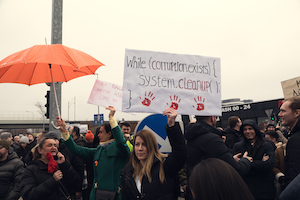
November 5
1-2 pm (s.t.)
GD 102 and via livestream
Stefan Janković: On Political Liminality. Serbia's Student Protests and the Remapping of Political Space
In cooperation with with the Viadrina Center B/ORDERS IN MOTION
Moderation: PD Dr. Carolin Leutloff-Grandits (Viadrina Center B/ORDERS IN MOTION)
Since November 2024, student-led protests sparked by a fatal collapse at the Novi Sad train station have become one of the most significant mobilizations in Serbia’s recent history, pressing for accountability, transparency, and democratic reforms. Over the past year, joined by teachers, high school pupils, and citizens, students have used blockades, strikes, and occupations of media buildings and squares, supported by decentralized networks of coordination, to sustain pressure on state institutions. Whereas the government’s response has oscillated between repression and attempts at delegitimization, the movement’s tactics have shown remarkable persistence and adaptability, posing a serious test for how we conceptualize political mobilization. This lecture approaches the student movement through the lens of political liminality, emphasizing its capacity to distort the legitimate politics. By tracing the material infrastructures of blockades and occupations, we argue that students reconfigured flows, sites, and publics, enacting fragile but concrete re-territorializations of the political space.
The lecture will be held in English.
Note: Due to technical problems, approximately the first 20 minutes of the livestream could not be broadcasted. We apologise for this. However, the complete unedited recording of the event is now available to listen to and watch at the following link: https://europa-uni.cloud.panopto.eu/Panopto/Pages/Viewer.aspx?id=f6c619c0-8465-464e-8faa-b36800627d26.
Stefan Janković: Digging into Ecopolitical Dispute. Mapping Controversies around Lithium Extraction in Serbia
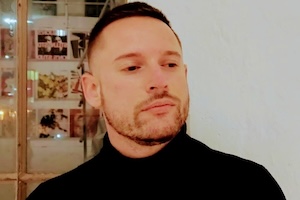
November 03
4:15-5:45 pm,
room AM 233 and online on Zoom.
Lecture as part of the Lecture Series "Beyond Sustainability: Humanities and Social Sciences Perspectives on the Ecological Crisis".
Stefan Janković: Digging into Ecopolitical Dispute. Mapping Controversies around Lithium Extraction in Serbia
The proposed lithium mine in Serbia's Jadar Valley has become one of Europe's most contested ecopolitical disputes. Initially promoted by Rio Tinto and the Serbian government as a driver of development and green transition, it soon provoked massive resistance over ecological risks, legality, and transparency, turning into a paradigmatic case of the Anthropocene's ontopolitical rupture. The lecture examines how human and non-human actors mobilise claims and shape collective action, while digital infrastructures condition visibility and volatility of disputes. It relies on controversy mapping of 1,004 texts (2004-2025) to trace how evidence, sovereignty, and ecological vigilance were articulated through networks of alliances and oppositions. Findings show cycles of escalation, suspension, and resurgence, culminating in four meta-controversial registers, which reveal deeper struggles over liveable futures in the Anthropocene.
Opening of the Lecture Series 'Beyond Sustainability: Humanities and Social Sciences Perspectives on the Ecological Crisis'
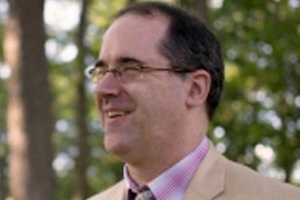
October 27
4:15-5:45 pm,
room AM 233 and online
Opening of the Lecture Series "Beyond Sustainability: Humanities and Social Sciences Perspectives on the Ecological Crisis", winter semester 2025/26, mondays, 4:15-5:45 pm, room AM 233 and online. This lecture will be held online, listeners are welcome to attend in person.
Jason Moore: On the 'Sustainability of the Rich'. How the One Percent uses Nature to Make You Afraid, Keep its Wealth, and Hold on to Power
In this lecture, environmental historian Jason W. Moore exposes the "climate hoax" at the heart of contemporary sustainability politics, arguing that the planetary elite-the Point One Percent-exploits genuine biospheric crises to safeguard their wealth and power while imposing austerity on the masses. Drawing on historical patterns from the Little Ice Age to the 1960s environmental revival, Moore reveals how ruling classes have repeatedly invoked "Nature" during moments of social unrest to justify repression, enclosure, and technocratic control. Far from an anthropogenic disaster, the climate crisis is capitalogenic, driven by capitalism's relentless quest for Cheap Nature-a system now faltering amid agricultural stagnation, overaccumulation, and political instability. Moore critiques both climate maximalists, who hype apocalyptic doom to demand emergency rule, and minimalists, who down play impacts in favour of techno-market fixes, as two sides of the same elite coin. Instead, he indicts the eco-industrial complex as a mechanism for greenwashing monopoly capitalism. Yet, there's opportunity in the chaos: climate disruption weakens elite grip, opening doors for mass movements to reclaim the web of life for the working-class majority. Rejecting fearmongering and the authoritarianism of climate emergency politics, he calls for a radical reframing: democratising the web of life and reclaiming power from the bankers, Tech Bros, and warmongers.
Jason W. Moore teaches world environmental history at Binghamton University, USA, where he coordinates the World-Ecology Research Collective. He hates war, loves the working class, and looks forward to the day when the expropriators are expropriated. Recent books include L'écologie-monde ducapitalism (2024), Oltre la giustiziaclimatica (2024), La gran implosion: Clase, imperio y crisis climática en el capitalismozombi (2025), and with Raj Patel, A History of the World in Seven Cheap Things (2017). The tenth anniversary edition of Capitalism in the Web of Life will be published later this year. His books and essays on class, capital, and empire in the web of life have been awarded the Alice Hamilton Prize in environmental history, the Byres and Bernstein Prize in agrarian studies, the Braverman Prize in labour studies, and the Immanuel Wallerstein Award. A prolific writer and speaker, Moore's interviews, lectures, and essays can be found in over 20 languages on his website: https://jasonwmoore.com/.
Beyond Sustainability: Humanities and Social Sciences Perspectives on the Ecological Crisis
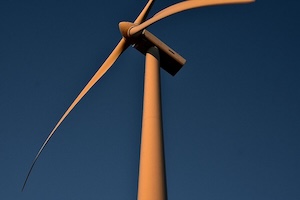
Lecture Series, winter semester 2025/26
Mondays, 4:15-5:45 pm, room AM 233 and online via Zoom
Conveners: Amelie Kutter and Estela Schindel
Climate change, extractivist devastation, ocean acidification, and the accelerating loss of species continue to worsen worldwide, with environmental damage intensifying across the globe. As the ecological crisis deepens, the humanities and social sciences are called upon to develop resources — conceptual, analytical, and methodological — in order to make sense of the current situation and to respond to its challenges. The concept of sustainability — once central to environmental discourse — has been criticized for its association with technocratic, managerial, and neoliberal agendas that fail to address the structural, historical, and cultural dimensions of environmental degradation. At the same time, the crisis demands more than critique: it calls for innovative ways of thinking, organizing, and acting that engage with the social, political, ethical, and symbolic foundations of human-environment relations. This interdisciplinary lecture series brings together scholars from across the humanities and social sciences to examine the ecological crisis from diverse and complementary angles, including critical sustainability studies, decolonial ecologies, environmental justice, or posthumanist theory. By bringing these perspectives in dialogue, the lecture series aims to push the debate beyond sustain ability, toward new ways of thinking and acting in the face of ecological transformation.
All lectures will be held in English. Find the detailed program here: poster / flyer with abstracts.
Border controls at the Oder: Legal, political and humanitarian challenges
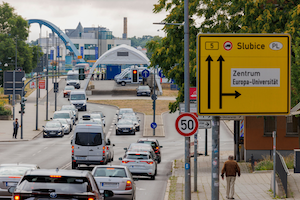
17 July
6:15-7:45 pm
Senatssaal (HG 109) and livestream via Zoom
Registration: https://forms.europa-uni.de/form/alias/EUV/grenzkontrollen-research-factory/. After registering, you will receive the link to the livestream by e-mail.
Border controls at the Oder: Legal, political and humanitarian challenges
(The event will be held in German. Simultaneous translation into English and Spanish will be available in the livestream.)
An event organised by the Viadrina Center B/ORDERS IN MOTION in cooperation with the European Reform University Alliance (ERUA) and the Viadrina Institute for European Studies (IFES).
Panel discussion with Marcus Engler (German Centre for Integration and Migration Research DeZIM), Lea Christinck (German Centre for Integration and Migration Research DeZIM) and Norbert Cyrus (Viadrina Center B/ORDERS IN MOTION), who have presented a current expertise on the effects of internal border controls, as well as Claudia M. Hofmann (Chair of Public Law and European Social Law with a focus on interdisciplinary social law research, EUV), Viadrina's European and social law expert, and Anja Hennig (Chair for Comparative Politics, EUV), specialist in German-Polish relations at the EUV. Moderation by Kira Kosnick (Viadrina Center B/ORDERS IN MOTION).
Two federal governments have introduced controls at Germany's external borders in several stages since autumn 2023. On 7 May 2025, the federal police were also instructed to push back asylum seekers. The Berlin Administrative Court ruled that the pushback of three refugees at the German-Polish border was unlawful in a decision on 2 June 2025. The situation in Frankfurt (Oder), where two stationary border checkpoints were set up, is the focus of public attention. Here, the three asylum seekers, whose pushback was judged to be unlawful, had tried in vain to apply for asylum. In the meantime, the Polish government has also announced the temporary introduction of controls at the border with Germany and Lithuania from 7 July 2025.
The panel discussion will categorise these developments and measures, particularly with regard to the rule of law and proportionality. Statements on the effectiveness of internal border controls as a means of reducing irregular entries and smuggling will be examined and contrasted with the negative effects on the border region, refugee protection and German-Polish relations.
A recording of the event and a review on the Viadrina news portal are now available online.
Lunch Lecture: Global trade war? International politics and capitalism in crisis
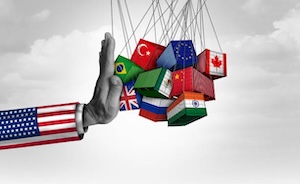
18 June
1-2 pm
GD 102
Global trade war? International politics and capitalism in crisis
IFES Lunch Lecture with Jürgen Neyer (European and International Politics / EUV) and Sascha Münnich (Sociology of Economics / EUV), moderated by Sonja Priebus (Europa-Studien / EUV).
In this lunchtime discussion, Jürgen Neyer (Professor of European and International Politics) and Sascha Münnich (Professor of the Sociology of Economics) will talk about the political and socio-economic aspects of the recent increase in protectionism and the escalation of trade policy conflicts between the USA, China and the EU. The discussion will analyse the causes and consequences of recent and expected tariff battles on the institutional design of transnational value chains, the financial system, and national economic and trade policy orientation. In addition, the question arises as to the political constellations at national and international level, and the interaction of these constellations in promoting or defusing escalations. Is the crisis a restoration or reorganisation of international (economic) policy, and what do these developments mean for ecological and digital transformation?
The discussion will be held in German. Questions can be asked in English. You are welcome to bring your own brown-bag lunch.
A recording of the event and a review on the Viadrina Newsportal are now available online.
Poland votes and Europe watches. What is at stake?
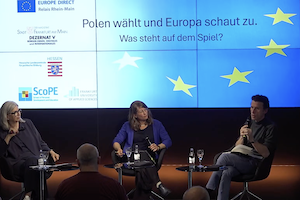
On May 9, 2025, before the first round, IFES member Anja Hennig discussed the upcoming presidential elections in Poland and everything related to them with the journalist Jan Opielka and the moderator Carla Sappok (Speakers-Pool Team EUROPE DIRECT of the European Commission) at the Protestant Academy in Frankfurt am Main. Among the topics discussed were the situation of the rule of law, security, migration and economic policy, the Catholic Church and its influence on moral policy and education, as well as demographic factors and social attitudes.
"Human and Planet" Talk Series
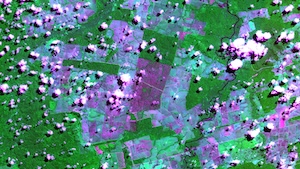
The Human and Planet Talk Series aims to provide a platform for teaching, research and transfer on issues related to the socio-ecological crisis and climate change in a multidisciplinary and broad perspective. Based at the Viadrina Institute for European Studies, this open series welcomes contributions from colleagues and students interested in topics including but not limited to
- Global warming and climate change: social, economic and political dimensions
- Environmental disasters: loss of biodiversity, ocean acidification, changes in hydrological cycles (floods, droughts, dying rivers)
- Sustainability, mitigation & adaptation, de-growth: the diversity of frameworks aimed at addressing the current crisis at the levels of politics and civil society
- Extractivism, capitalism and global North-South inequalities
- Human-nature and/or culture-nature dualism: historical, anthropological and philosophical approaches
- The Anthropocene in the humanities, literature and the arts: ecocriticism and the search for languages for nature crisis and loss.
This series provides a permanent but flexible format for ongoing reflection and exchange on teaching and research on these topics. We are happy to co-organise related activities, to host reading groups and seminars, and to serve as a hub for connecting projects from the Viadrina.
Dates in the summer semester 2025:
03.07.2025, 11 am-1:15 pm: How to research about Rights of Nature? Accounts from the field by advanced and graduated master students
With MA Moritz Wiegand, Alba Trabandt and Valeria Florez. Session as part of the seminar “Rights of Nature from the Global South to Europe: Practices, Cosmovisions, Policies” conducted by Anja Hennig and Estela Schindel.
02.07.2025, 6:15-7:45 pm, HG 217: Paradise Lost? Art facing the Anthropocene
Pierre Wat (Paris/EUV)
09.05.2025, 6:30-8:00 pm: The Reality of Ghosts: Haunted Landscapes in the Anthropocene
Juliane Rebentisch (Hamburg/Princeton)
Dates in the winter semester 2024/25:
27.11.2024, 5:30-6:30 pm: Climate protection after Baku: Reimund Schwarze in conversation
Reimund Schwarze (Helmholtz Centre for Environmental Research)
17.12.2024, 4:15-5:30 pm: Reflections on the Past and Future of the Kakhovka Hydropower Plant Area (KHPP)
Tetiana Gardashuk (National Academy of Sciences of Ukraine), in cooperation with the Competence Network Interdisciplinary Ukraininan Studies (KIU)
6.01.2025, 4:15-5:45 pm: European Values in the EU's Developmental, Energy and Climate Policies
Randall Halle (Pittsburgh University), in cooperation with the Jean Monnet Policy Network ValEUs
Juliane Rebentisch: The Reality of Ghosts: Haunted Landscapes in the Anthropocene
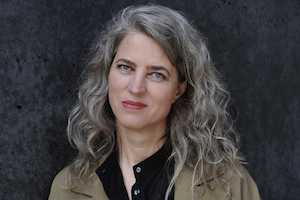
09 May
6:00-7:00 pm
Logensaal, LH 011
Juliane Rebentisch: The Reality of Ghosts: Haunted Landscapes in the Anthropocene
A keynote lecture in english by Juliane Rebentisch (Hamburg/Princeton) at the conference "Realisms of Relations. Ecologies of Art in the Aftermath of Modernity" of the Junior Professorship for Theory of Arts and Media and in cooperation with the IFES "Human and Planet" Talk Series.
One way in which people today realize their relations to non-human beings is through the recognition of their absence. The uncanny feeling that there is „nothing where there should be something“ (Mark Fisher) corresponds to a perception of landscapes as haunted by overlaying histories of violence. A sensitivity to the ghosts of the Anthropocene – to the signs of past forms of life – corresponds to an impulse not to forget and to confront loss in the age of mass extinction. The lecture will examine the realist twist on the motif of haunting in ecocritical discourse and discuss its consequences for a politics of mourning.
Juliane Rebentisch is Professor of Philosophy at Hochschule für bildende Künste Hamburg. From 2014 to 2024, she was a member of the Research Council at the Frankfurt Institute for Social Research, with which she is now associated as a Permanent Fellow. Since 2019, she is a Regular Visiting Professor at the German Department of Princeton University. She held the office of President of the German Society for Aesthetics from 2015 – 2018. In 2017, she was awarded the Lessing Prize of the Free and Hanseatic City of Hamburg. Publications include: Aesthetics of Installation Art (Sternberg 2012); The Art of Freedom. On the Dialectics of Democratic Existence (Polity 2016); Theorien der Gegenwartskunst zur Einführung (Junius 2013); Der Streit um Pluralität. Auseinandersetzungen mit Hannah Arendt (Suhrkamp 2022).
Brandenburg after the federal election: Analysis and outlook
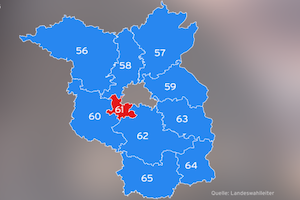
29 April
6:15-7:45 pm
Senatssaal, HG 109
Brandenburg after the federal elections: Analysis and outlook
Panel discussion in German with:
Gideon Botsch (Universität Potsdam)
Tom Leistner (Projektleiter „Wir sind der Osten“)
Theresa Gessler (EUV)
Moderation: Susann Worschech (EUV)
In the federal election on 23 February 2025, the AfD emerged as the strongest political force in Brandenburg, a party that represents xenophobic or even racist, anti-scientific and anti-democratic positions. Beyond the consequences at federal level, this raises questions that affect Brandenburg as a place of work and learning: what does this election mean for our city and our university? With a view to the possible causes of this result, but above all to the future prospects for the state, city and university, the IFES invites to a discussion.
Reimund Schwarze: Plea for a holistic climate policy (in German)
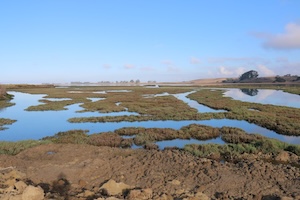 "Perhaps the greatest fallacy of current climate policy is the misleading assumption that the climate crisis can be overcome by technical solutions alone and without involving nature." (Reimund Schwarze, 10.03.2025)
"Perhaps the greatest fallacy of current climate policy is the misleading assumption that the climate crisis can be overcome by technical solutions alone and without involving nature." (Reimund Schwarze, 10.03.2025)
In his "Plea for a holistic climate policy and a reorganisation of competencies in the new German government", professor Reimund Schwarze advocates climate protection that focuses not only on technical solutions but also on nature-based solutions and their immediate potential, as well as taking the principles of a just energy transition seriously in international, national and local climate policy. Schwarze concludes his plea with concrete reform proposals for national and international policy.
The political systems in Eastern Europe: institutions, actors and processes
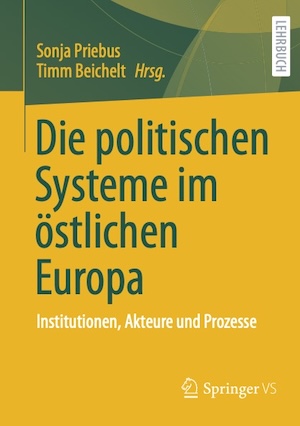
The book offers a comparative presentation of the political systems of the states of Eastern Europe, i.e. all states in Central, Eastern and South-Eastern Europe. The 22 country chapters describe and analyse central institutions such as parliament, government, president and the electoral system. In order to take into account the strong dynamics of transformation and post-transformation, the social and historical embedding of the institutions is also analysed.
The book has been edited by Sonja Priebus and Timm Beichelt, published by Springer VS and is aimed at students of political science and anyone interested in the dynamic political developments in Eastern Europe.
Annual Report 2024
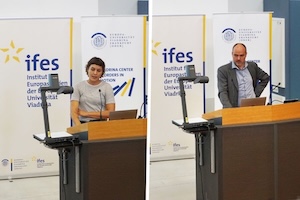
The relaunch of the Working Paper Series, the start of the Talk Series "Human & Planet", including lectures on the COP29 and reflections on the value of rivers in the context of the Russian war of aggression in Ukraine, as well as other public events and contemporary analyses, including events to mark the 40th anniversary of Michel Foucault's death and on the ongoing border controls on the German-Polish border and their impact on Frankfurt (Oder) and the elections in the USA - these were the topics of activities at IFES last year.
